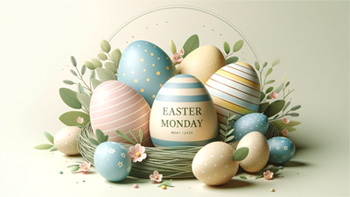 Easter Monday in Ireland
Easter Monday in Ireland


Easter Monday in Ireland is a day rich in history, culture, and tradition, marked by a blend of religious significance and national sentiment. Falling on the Monday after Easter Sunday, this day is not just a continuation of the Easter celebrations but also a commemoration of a pivotal moment in Ireland’s history. This article delves into the various facets of Easter Monday in Ireland, exploring its religious roots, historical importance, traditional practices, and how it is celebrated in modern times.
The Religious Significance of Easter Monday
Easter Monday's religious significance in Ireland is closely tied to the Christian celebration of Easter, which commemorates the resurrection of Jesus Christ. It’s a day that caps the Holy Week, echoing the message of hope and renewal central to Easter. Traditionally, it’s a time for families to attend church services together, continuing the spiritual reflection that characterizes the Easter season. The religious observances on this day are reflective of Ireland’s strong Christian heritage, which plays a significant role in the country’s cultural identity.
Historical Importance: The 1916 Easter Rising
Beyond its religious connotations, Easter Monday holds a special place in Irish history due to the 1916 Easter Rising. This was a significant event in the struggle for Irish independence from British rule. On Easter Monday in 1916, Irish nationalists staged a rebellion in Dublin to establish an independent Irish Republic. Though the uprising was eventually suppressed, it was a crucial step towards Ireland’s eventual independence. The day is imbued with a sense of national pride and is a time to remember the sacrifices made by those who fought for Ireland’s freedom.
Traditional Celebrations and Activities
Traditionally, Easter Monday in Ireland was a day for various customs and activities. It was common for communities to hold events such as egg rolling competitions, where children would roll painted eggs down hills. These activities not only provided entertainment but also symbolized the rolling away of the stone from Christ’s tomb. Families would often spend the day outdoors, enjoying the spring weather, as Easter Monday was also seen as a celebration of the changing of the seasons.
Modern Celebrations and Commemorations
In contemporary Ireland, Easter Monday is a public holiday and a day off for most people, providing an opportunity for various modern celebrations. It has become a day for cultural and community events, including parades, music festivals, and family-friendly activities. Many of these events pay tribute to the historical significance of the Easter Rising, with reenactments, readings, and exhibitions that educate and commemorate.
One of the key modern commemorations is the official ceremony in Dublin, which includes the reading of the Proclamation of the Irish Republic and a military parade. These events not only honor the past but also celebrate the nation’s progress and future.
Easter Monday in Ireland, therefore, represents a fusion of the past and present, of religious observance and national commemoration. It’s a day that encapsulates the multifaceted nature of Irish culture, blending historical remembrance with modern celebrations. Whether through attending church services, participating in community events, or reflecting on Ireland’s history, Easter Monday remains an important and cherished day in the Irish calendar, symbolizing both the nation's resilience and its enduring spirit of hope and renewal.